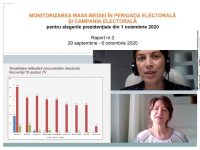MONITORING REPORT NO. 2 ON THE MEDIA (TV STATIONS) DURING THE 2020 PRESIDENTIAL CAMPAIGN
On October 9, 2020, the Independent Journalism Center (CJI) released its second monitoring report on the media during the election period and campaign for the presidential election of November 1, 2020.
From September 29 through October 6, 2020, CJI has monitored ten public and private media outlets with national and regional coverage in Romanian and Russian. The second monitoring showed that Igor Dodon, independent presidential candidate supported by the Party of Socialists of the Republic of Moldova (PSRM), was the first among the candidates who enjoyed positive coverage, being massively advantaged on three out of ten TV stations. On the other hand, PAS candidate Maia Sandu had most apparitions presented in a negative light. The parliamentary groups of PSRM and the Șor Political Party enjoyed positive coverage most often, whereas the work of state agencies was presented mostly in neutral tones. These findings were presented in the second monitoring report released by the Independent Journalism Center (CJI) during the campaign for the presidential election of November 1, 2020.

According to the report, the public TV station Moldova 1 offered relatively equal airtime to presidential candidates and political parties in its newscasts and presented them in most cases in neutral tones. Igor Dodon was slightly advantaged by two apparitions as a presidential candidate in a positive context, enjoying the transfer of image from positive news reports about the government.
The private TV stations Primul în Moldova, NTV Moldova, and Accent TV followed the same editorial policy, mostly using identical angles of coverage and identical sources. Most materials promoted the government and PSRM, presenting subjects involving government representatives mainly in a positive light. Igor Dodon enjoyed massively favorable treatment from these stations, both by frequent apparitions and direct interventions and by the positive tone of the coverage. These stations also presented many materials about Maia Sandu, candidate for PAS, most of which had a negative connotation. The other candidates were presented in relatively neutral tones.
Televiziunea Centrală engaged actively in the coverage of the presidential campaign, offering relatively equal airtime to all candidates, whom it presented mostly in neutral tones. Violeta Ivanov of the Șor Political Party was the only candidate who enjoyed positive coverage.
Prime TV and Publika TV had editorial policies that were similar to each other, informing about the campaign only in the news reports where all presidential candidates had airtime. The tone of the coverage of candidates and political parties was mostly neutral, and state institutions, especially the government, were presented both in neutral and positive tones.
Jurnal TV, Pro TV, and TV8 actively participated in covering the campaign both in newscasts and in other programs, following a correct and balanced policy. The tone presidential candidates and political parties were presented in the news was mostly neutral, without clear biases in their favor shown through the frequency and duration of apparitions. State agencies were presented mostly in a neutral or negative light.
By monitoring the media, CJI intended to inform the public about the behavior of the press during the election campaign and the access of election candidates to media coverage and to notify regulatory entities about the trends that could impact the performance of media outlets or compromise their capacity to offer trustworthy, detached, and pluralistic information.
CJI recommends the Broadcasters Council to use the monitoring reports to assess themselves and to see whether the monitored TV stations observed the right to full, objective, and trustworthy information.
All told, the monitoring covered ten radio stations: Moldova 1, Prime TV, Publika TV, Jurnal TV, NTV Moldova, Primul în Moldova, Accent TV, Pro TV, TV8, and Televiziunea Centrală. The broadcasters were selected by the following criteria: audience/impact (national, regional), type of media (broadcasting), ownership form (public, private), broadcasting language (Romanian, Russian).
This report was produced by the Independent Journalism Center as part of the project Media Enabling Democracy, Inclusion and Accountability in Moldova (MEDIA-M) implemented by Internews in Moldova with the support of the US Agency for International Development (USAID) and UKAID. The views expressed in it are those of the authors and do not necessarily reflect the position of the funders.
